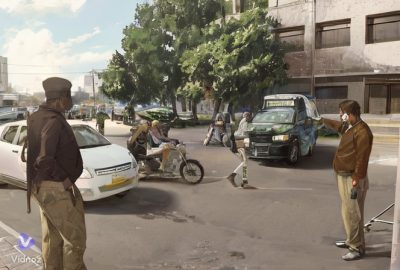By Syed Atiq ul Hassan, Sydney Australia
Karachi, once a thriving city known for its vibrant business community and harmonious atmosphere, has unfortunately fallen into the grip of criminal elements. Prior to the partition of India in 1947, Karachi was primarily inhabited by fishermen and businessmen, fostering a culture of cooperation and entrepreneurship. It boasted bustling ports like Debal, attracting international trade and visitors. The city produced notable figures in education and politics, including Pakistan’s founding father, Quaid-e-Azam Muhammad Ali Jinnah, and Mather-e-Millat Fatimah Jinnah. Designated as Pakistan’s capital upon its inception, Karachi enjoyed global renown and was often likened to a “mini-London” during British colonial rule. However, the landscape began to change following the introduction of military rule by General Ayub Khan, who sought to relocate the capital to Islamabad, citing security concerns.
1947, Karachi was primarily inhabited by fishermen and businessmen, fostering a culture of cooperation and entrepreneurship. It boasted bustling ports like Debal, attracting international trade and visitors. The city produced notable figures in education and politics, including Pakistan’s founding father, Quaid-e-Azam Muhammad Ali Jinnah, and Mather-e-Millat Fatimah Jinnah. Designated as Pakistan’s capital upon its inception, Karachi enjoyed global renown and was often likened to a “mini-London” during British colonial rule. However, the landscape began to change following the introduction of military rule by General Ayub Khan, who sought to relocate the capital to Islamabad, citing security concerns.
The influx of around one million migrants, known as Muhajirs, to Karachi post-partition significantly altered the city’s demographics. Despite initial acceptance and integration by the local populace, tensions began to simmer, exacerbated by political shifts and administrative changes. The subsequent move of federal offices and diplomatic missions to Islamabad further marginalized Karachi, leading to job losses and resentment among its residents. Moreover, the introduction of quotas favoring rural areas in Sindh, initiated by Zulfiqar Ali Bhutto’s government, perpetuated inequality and hindered the advancement of Karachiites (being in Urban Sindh) in government jobs and higher education.
The detrimental impact of these policies became increasingly evident over the years, as Karachi’s once-flourishing educational institutions and civil service succumbed to corruption and inefficiency. Uncontrolled urbanization, coupled with unchecked migration, exacerbated the city’s infrastructure woes, resulting in a severe lack of essential services such as water, electricity, healthcare, and transportation. While other cities in Pakistan, notably in Punjab, have seen some degree of planned development, Karachi has languished without a coherent urban strategy, leading to its decline from an international metropolis to a hotbed of crime and instability.
The Sindh Police Services has become synonymous with corruption and criminal elements, having been infested with individuals with dubious backgrounds and a history of criminal activities. For over three decades, the rulers of Sindh have shamelessly appointed individuals tainted by political favoritism and bribery, further tarnishing the integrity of law enforcement.
Since 1992, the situation in Karachi has been exacerbated by the deployment of Rangers, yet both the Sindh Police and Rangers have woefully failed to maintain law and order in the city. Instead of upholding justice, these agencies have become complicit with criminal syndicates, emboldening them to openly terrorize citizens through street robberies, home invasions, and other heinous crimes.
The alarming reality is that the citizens of Karachi, a sprawling metropolis of over 30 million people, face a barrage of 5 to 10 criminal incidents involving killings on a daily basis. However, their plight remains largely unaddressed as they find themselves at the mercy of the very institutions entrusted with their protection— the Sindh Police and Rangers, who have shamelessly aligned themselves with criminals.
It’s a paradoxical scenario where those tasked with combating crime are themselves deeply entrenched in extortion rackets and other illicit activities. How can the Karachiites expect law enforcement to effectively curb criminal activities when they are actively involved in perpetuating them?
This dire situation underscores the urgent need for systemic reforms within the Sindh Police and a reconsideration of the deployment of Rangers in the city, which incurs a significant financial burden on taxpayers. The ground reality is that innocent citizens fall victim to brazen acts of violence and lawlessness daily. The absence of effective governance and leadership has left the city adrift, devoid of a vision for its future. Today, Karachi, as Pakistan’s largest and most populous city, faces numerous issues ranging from political instability to socioeconomic disparities and rampant crime. Furthermore, it is essential to address the root causes of crime and neglect, such as poverty, unemployment, and lack of access to basic services like education and healthcare.
As for the worst law and order situation in the city, a comprehensive overhaul of recruitment practices free from political interference, rigorous accountability mechanisms, and genuine commitment to upholding the rule of law can restore lost public trust and ensure the safety and security of Karachi’s residents. However, the question remains whether Karachiites can trust the corrupt and incompetent Sindh government and political elite to bring about any reform or even formulate a plan on paper. This is the million-dollar question with no clear answer.
What was once a beacon of economic prosperity and cultural diversity now struggles to reclaim its former glory, overshadowed by the spectre of crime and neglect. It is imperative that concerted efforts be made to address Karachi’s myriad challenges and restore it to its rightful place as a vibrant and thriving metropolis. Nevertheless, this seems unattainable as long as the corrupt PPP government and MQM Pakistan are involved in corruption and the misappropriation of taxpayers’ money under the guise of providing a safe and secure Karachi.
(The writer is a Sydney-based journalist, political analyst, writer and a commentator. He is a former native citizen of Karachi. His email is shassan@tribune-intl.com ).
Syed Atiq ul Hassan
Sydney-based journalist, political analyst and a commentator, Community Representative,
Editor, Tribune International, Australia
Mob +61 479 143 628




